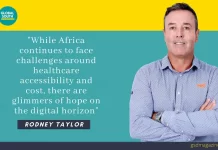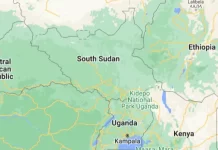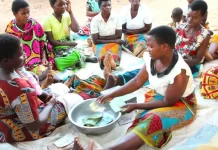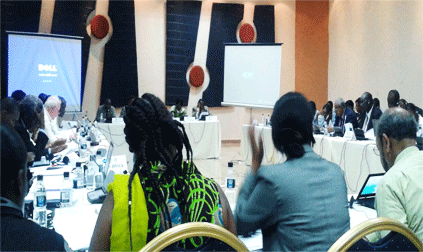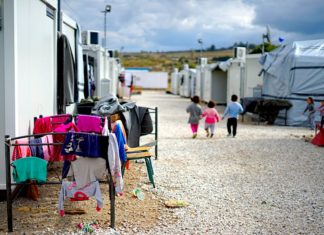lBy Debora Di Dio
[dropcap]I[/dropcap]n small rural villages of West Africa, the children orphaned by Ebola remain vulnerable to stigmatization, hunger, malnutrition, and in some cases even violence.
It’s been over a year now that West Africa has been struggling with an invisible and deadly enemy, the Ebola virus disease. The word brings to mind images of courageous frontline health crews donning white overalls, gloves and goggles, and the suffering of grieving family members who have lost their loved ones to a disease that still remains strong after a year.
Everybody around the world has come to know what the word Ebola means, and TIME magazine even declared Ebola fighters as Person of the Year 2014 for their incredible and painstaking battle. As of April 2015, the World Health Organization (WHO) and respective governments have reported a total of 26,194 suspected cases and 10,857 deaths, though it is believed that these numbers substantially understate the magnitude of the outbreak. In addition, thousands of people are fighting for their life while being treated at Ebola Treatment Units, including many children, for which accurate statistics remain unavailable.
What is Ebola and How it is Manifested?
The Ebola Virus Disease (EVD) can cause symptoms that are nonspecific at first, like headache, fatigue and pains. However, if proper supportive care is not provided, it can cause internal bleeding and death in just a few weeks. The current Ebola outbreak is the largest in history, and in 2014 the World Health Organization (WHO) declared it a global health emergency.
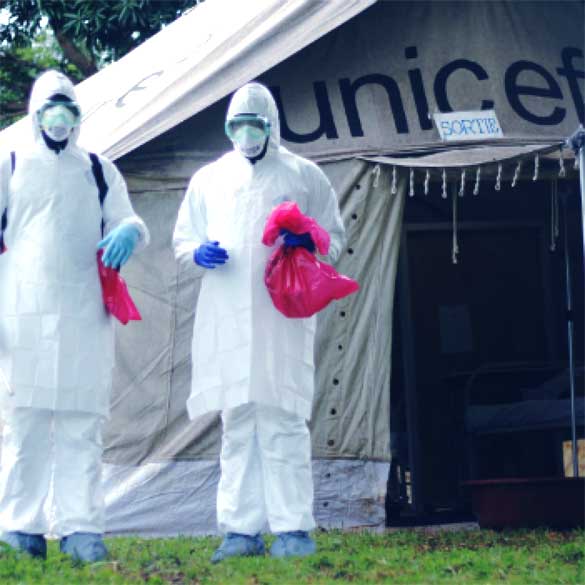
The West African countries of Liberia, Sierra Leone and Guinea have been the most affected, and while the worst part of the virus transmission is over, sporadic outbreaks continue to be reported in urban centers and porous border towns, where people are vulnerable to cross-border transmissions. With the onset of the dry season, it is expected that more people will be on the move, heightening the risk of potential spread.
The Impact of Ebola: Beyond Healthcare
Poverty and neglect of health systems contributed to the West African Ebola outbreak, and the indirect effects of Ebola will lead to further deepening of poverty and degradation of health systems, thus creating wider challenges for the future. The London School of Hygiene and Tropical Medicine (LSHTM), which has been active in fighting the epidemic in West Africa, has stated: “the indirect effects of epidemics such as Ebola, on a nation’s economy and health can be much greater than the direct ones”.
The Ebola epidemic will certainly have an impact on the economy, with significant reductions in national income or gross domestic product (GDP) likely. In West Africa, the World Bank has estimated an Ebola-based economic loss of between $4 billion and $30 billion: from 0.5% to 3% of the region’s GDP[1]. Reductions in GDP means that governments can’t afford to spend on core public services, such as healthcare and education. Businesses close and people lose their jobs, and without work people can no longer afford food, clothing, and other essentials for life. Ebola contributes to a vicious cycle of development whereby poor health leads to a poorer economy, and in turn even poorer health.
See Also: Fighting Ebola in a Poorly Connected World
Why are Children Most Affected?
Children in developing countries face a number of risks everyday, and when an emergency strikes, they are always among the most vulnerable. Although the number of Ebola infections is slowing down, the crisis has created urgent needs in child protection, education, health and livelihoods across the region, which is home to 22.3 million people. According to the United Nations Children’s Fund (UNICEF), over 9.4 million children are living in the affected areas of West Africa, and children account for around one fifth of all confirmed cases of Ebola to date.
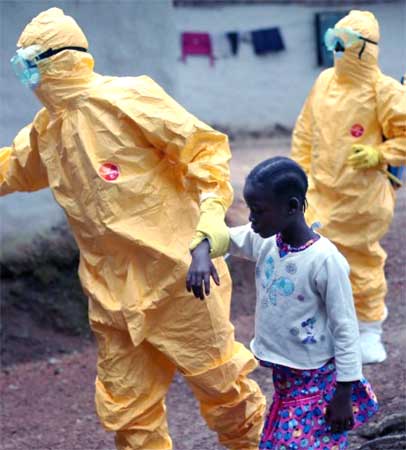
In addition to the children who have been infected with Ebola, a far greater number of them have lost one or both parents or caregivers in this crisis. UNICEF has reported that as of February 2015, the number of children orphaned by Ebola in Guinea, Liberia and Sierra Leone who have lost one or both parents, or their primary caregivers since the start of the outbreak has now reached 16,000, and many are being rejected by their surviving relatives for fear of infection.
The international organisation Save the Children has indicated “since the initial Ebola outbreak, children and their families have been exposed to extreme distress due to loss, family separation, isolation and overall disruption of society. Children have been especially frightened by prolonged confinement at home or isolation units and by witnessing the suffering of family members. Although the number of new Ebola cases is declining, orphans and child survivors continue to face abandonment and stigmatization in their communities”.
When unaccompanied or separated children are admitted to treatment centers or become orphaned, they risk psychosocial distress and exploitation. They are in urgent need of family tracing, reunification and reintegration, alternative care, psychosocial support and assistance in meeting day-to-day needs. Already weak health systems suffered under the strain of the outbreak, which reversed considerable gains made in recent years to curb maternal and child deaths. Furthermore, school closures in the three countries affected the education of more than 5 million children, putting them at risk of dropping out of school or engaging in exploitative situations, such as child labor.
Meeting Children’s Needs Throughout the Ebola Response
UNICEF has reported that “thousands of children are living through the deaths of their mother, father or family members from Ebola. These children urgently need special attention and support; yet many of them feel unwanted and even abandoned. Orphans are usually taken in by a member of the extended family, but in some communities, the fear surrounding Ebola is becoming stronger than family ties.”
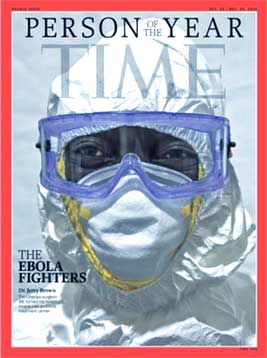
It is critical for organisations on the ground to ensure that their response is adapted and tailored to the needs of the most vulnerable children and families who have been affected by the outbreak. This is valid for all humanitarian actors, not just those who have the mandate to assist children in emergencies or improve access to healthcare. For instance, strengthening efforts to identify new cases, isolate and treat Ebola patients, and conduct contact tracing in order to interrupt individual chains of transmission is important, but it should be conducted side-by-side with the scale-up of child registration, family tracing and reunification activities, as well as counselling, food and clothing to children who return to their families or to an alternative caregiver for unaccompanied and orphaned children.
Humanitarian organisations that facilitate access to education in emergencies must work with national governments to ensure that schools continue to be safe and have water, sanitation and hygiene supplies and proper infection and prevention control equipment. Save the Children for instance, among others, is working to implement health screenings for students to make sure they are up to date on their vaccinations. This will ensure other preventable diseases such as tuberculosis and measles are not transmitted in schools. UN agencies and NGOs have made tremendous efforts to train teachers on Ebola safety procedures, and it is important that donors continue their support, so that teachers are ready to help children transition back to the classroom after many months out of school.
See Also: Conflict in the DR Congo: A Reflection from the Field
As hope grows in West Africa due to decreasing Ebola infections, there are many obstacles to overcome: devastated health care systems, loss of education and distressed social structures just to name a few. In small rural villages, the children orphaned by Ebola remain vulnerable to stigmatization, hunger, malnutrition, and in some cases even violence. And some of these children are survivors of Ebola themselves. This is one of the first obstacles that must be overcome if West Africa is to recover from this deadly epidemic.
(Debora is GSDM’s Special Correspondent for Global Humanitarian Affairs. The views expressed in this article are those of the author and do not represent the views of, and should not be attributed to, the United Nations agencies or humanitarian organizations working in the Ebola response.)
[1] From “Ebola in Context”, The London School of Hygiene and Tropical Medicine (LSHTM), April 2015



